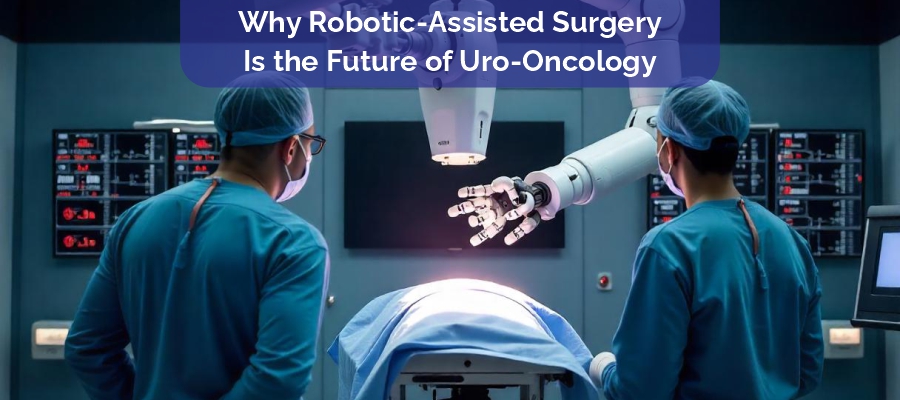
Why Robotic-Assisted Surgery Is the Future of Uro-Oncology
The field of uro-oncology has been revolutionized by significant breakthroughs in recent decades. Among these, robotic-assisted surgery stands out as a revolutionary step forward, redefining how urological cancers are treated. With the rising prevalence of prostate, kidney, and bladder cancers, the demand for treatments that combine precision, safety, and speed has never been higher. Cities like Ahmedabad have emerged as key centers where cutting-edge robotic surgery technology is being leveraged to improve patient outcomes. Specialized centers such as Gujarat Uro Oncology Associates exemplify this progress, offering robotic-assisted surgical solutions that are transforming cancer care.
Understanding Robotic-Assisted Surgery
Robotic-assisted surgery employs sophisticated robotic systems designed to aid surgeons during complex procedures. Instead of large incisions like in open surgeries, robotic surgery is minimally invasive, meaning smaller cuts and a gentler approach. Through a handful of small incisions, robotic arms equipped with miniature surgical instruments enter the body. Surgeons can achieve more precise movements and an extended range of motion through these instruments, which faithfully reproduce their hand gestures.
The surgeon controls the robotic arms from a console, viewing the operative field in high-definition 3D, which provides superior visualization. With this technology, surgeons gain enhanced dexterity and greater stability, leading to accurate dissection and manipulation of the most delicate tissues. Importantly, the robot does not operate autonomously; the surgeon remains in complete control, with robotic technology serving as an extension of their expertise.
Why Robotic Surgery Is a Game-Changer in Uro-Oncology
- 1. Minimally Invasive Approach
- 2. Enhanced Precision and Accuracy
- 3. Better Outcomes with Fewer Complications
- 4. Suitability for Complex Cases
Robotic-assisted surgery requires only tiny incisions, often less than an inch long. This procedure causes much less trauma to the body than traditional open surgery. Patients usually have less blood loss, less pain after the operation, and a quicker recovery. In practical terms, shorter hospital stays and quicker returns to daily life are common benefits observed with robotic surgeries.
Cancer surgeries demand meticulous precision to remove all cancerous tissue while sparing surrounding healthy structures. Urological procedures demand utmost precision because it's key to preserving essential functions like urinary continence and sexual health. Robotic systems offer magnified 3D visualization and fine motor control that surpass human capability. This leads to more precise tumor removal and nerve preservation.
Clinical studies indicate that robotic-assisted uro-oncological surgeries often have lower complication rates. The combination of improved visualization and steady instrument control minimizes damage to nearby blood vessels, nerves, and organs. This translates into fewer surgical complications such as infections or bleeding, and better long-term functional results.
Some urological cancers occur in locations that are difficult to access with traditional surgery. Robotic instruments with their flexible wrists and precise control allow surgeons to operate in tight spaces with ease. This expands the scope of patients eligible for minimally invasive surgery.
Common Uro-Oncological Surgeries Using Robotics
- Prostate Cancer Surgery (Robotic Radical Prostatectomy)
- Kidney Cancer Surgery (Robotic Partial Nephrectomy)
- Bladder Cancer Surgery (Robotic Radical Cystectomy)
Prostate cancer is a very common type of cancer diagnosed in men. Robotic prostatectomy involves complete removal of the prostate gland using robotic assistance. The 3D magnified vision and robotic instruments facilitate precise removal of cancerous tissue while preserving nerves responsible for bladder control and sexual function. This results in lower rates of incontinence and erectile dysfunction compared to open surgery.
In cases of kidney tumors, removing only the tumor and preserving the healthy part of the kidney is ideal for maintaining renal function. Robotic partial nephrectomy allows for this kidney-sparing approach with remarkable precision. The robot’s enhanced dexterity helps control bleeding and delicately separate tumor tissue from healthy kidney.
For invasive bladder cancers, the bladder must be removed. Performing this challenging surgery with robotic assistance means smaller cuts, reduced bleeding, and patients often experience a faster recovery. Surgeons can also reconstruct new urinary pathways using robotic techniques, improving postoperative quality of life.
Robotic Surgery and Ahmedabad: Advancing Cancer Care Locally
Ahmedabad is quickly establishing itself as a prominent center for cutting-edge urological cancer treatments. Several hospitals and specialized urology centers in the city have adopted robotic-assisted surgery as a key treatment modality. This adoption ensures that patients in Ahmedabad can access world-class care without traveling long distances.
Future Perspectives
Robotic-assisted surgery continues to evolve with advancements in technology. AI and machine learning are emerging as key tools for improving how surgeries are planned and how surgeons are assisted during procedures. As these developments unfold, the precision and safety of uro-oncological surgeries are expected to improve even further.
Moreover, ongoing research is expanding indications for robotic surgery beyond traditional cancers to complex reconstructive urology and other subspecialties. The commitment of centers like Gujarat Uro Oncology Associates to adopting and advancing robotic technology ensures that patients in Ahmedabad will continue to receive cutting-edge care.
Conclusion
The future of uro-oncology treatment is here with robotic-assisted surgery, which masterfully blends minimal invasiveness with pinpoint accuracy. Its benefits extend beyond effective cancer removal to preserving quality of life through faster recovery and fewer complications. Ahmedabad’s growing network of specialized centers, including Gujarat Uro Oncology Associates, stands ready to deliver these advanced surgical options. This technology not only improves surgical outcomes but also brings hope to patients battling urological cancers.
The Gujarat Uro Oncology Associates are ready to manage patients every step of the way, offering expertise, empathy, and unwavering support. To learn more about services and embark on cancer journey with confidence, reach out at +91 75730 04253 or email bakshihemang@yahoo.co.in. Path to healing begins here.
